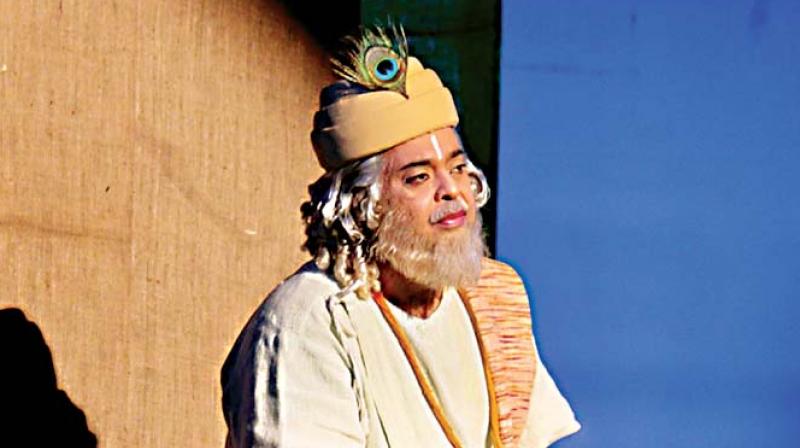Kahe Kabir: Weaving the story of a saint
Shrouded in mysticism and myth, stories of Kabir are both plentiful and varied - a complication for a biographer.

The first stage light flickers to life, its orange glow bringing Shekhar Sen slowly into view. Dressed in white, the slightly shabby attire of a sanyasin, he breaks into song. There is silence, save for his voice, which rings through the auditorium, "Yeh Pandit hai ya Maula?" This is Kabeer, a mammoth mono-act production by Shekhar Sen, the renowned musician and theatre artist, his biggest success on stage, has been performed 425 times around the world. On November 30, when Sen goes up on stage, it will be for the 1000th time. He grew up in Raipur, Chattisgarh, on the campus of the Indira Kala Sangeet Vishwavidyalaya, where both his parents worked.
Music was the language he knew most intimately and Sen, as a young boy, soon discovered a fondness for autobiographies. This was encouraged by his mother, the late Dr Aneeta Sen, who bought him many books. By the 1980s, Sen had established a name for himself in Mumbai, singing bhajans and by 1985, was doing 'research-oriented' programmes, like the ghazals of Dushyant Kumar and songs by mediaval poets like Kabir, Tulsidas, Raskhan and many others. Kabir, as fate would have it, was never too far away: His father’s uncle, the renowned scholar, Kshitimohan Sen, was the first Vice-Chancellor of Shantiniketan and the first to translate Kabir’s poems to Bangla. When Tagore first decided to translate his poetry to English, it was Sen who suggested he begin translating Kabir.
Tulsidas, Soordas, Kabeer and Swami Vivekananda were brought to life on stage by Sen's unmatched versatility (Kabeer alone has 38 characters and Sen provides a distinct voice for each one). One day, after Kabeer found success, he thought, "I don't deserve the money I'm making from this." He pulled out a map and traced a route from Kashi to Maghar and setting off on a yatra of 14 performances. "These are places that don't even have electricity, so I would go with all my lights, sound equipment and a generator to get it all running."
"I began working on my first script, Tulsidas, in 1997 - 98," he says. Having travelled a good deal already, Sen was amazed by the scale and glamour of big theatre productions, Broadway's Lion King is the name that springs most easily to his mind. "I thought, why can't we do these things in India, too? That's how it began."
Sen multi-tasks his way through the interview, successfully juggling his way through unconnected thoughts. It's a gift that comes in handy on stage. A mono-act production requires the virtuosity of both a musician and an actor: "I have a gift, I call it God's gift," he remarks. "If there is music playing, my mind automatically begins to count the bars (keep time)." Interspersed with dialogue and song, with a musical score that runs right through, timing is imperative. "It is a tough job," he agrees. "Actors would find it difficult to keep time musically and a musician might struggle with the dialogue."
His journey, however, began almost as soon as he was born. His parents, both renowned musicians, served as principal and vice-chancellor of what was then the only Music and Fine Arts University in the country. "I grew up on campus, so music was a constant thing, from 6 am to 10.30 pm. It was a privilege, really." Both his parents belong to the Gwalior gharana and Sen followed suit. His career soon took off in Mumbai, "I had 227 CDs out by the time I turned to theatre," he says.
Shrouded in mysticism and myth, stories of Kabir are both plentiful and varied - a complication for a biographer. "With Swami Vivekananda, I had the opposite problem - there was too much material!" When it was time to pepper the play with Bhojpuri, Sen decided to travel to Benaras, where he spent a week with a community of weavers. "The Bhojpuri spoken today is very different from what Kabir might have used in the 14th century. Today, their talk is crass - even a mother would call her son with a cuss word." 'For the family' was a strict motto for Sen and he proceeded to tone down the language without diluting the emotion underlying it.
Every play takes nearly a year to complete, for Sen begins from scratch. "Composing the music is probably the easiest part, because that is what I do. writing the script, however, is a challenge." The next task is no less challenging: committing the dialogue and songs to memory, in the correct sequence.
English subtitles will flash across the screen for those who aren't fluent in Hindi and Bhojpuri, It is a thoughtful addition, inspired by his many trips abroad (a Youtube search for Kabeer throws up results from a temple in Iowa), where he found people already enthralled by the poet-saint and eager to learn more.
Saahab breaks away from his other works. It was a remark made in passing that got Sen thinking: "Someone said to me that only great men can do such great things. I thought, no. Everybody is capable of greatness, you can learn the most profound and beautiful lesson from a stranger."

